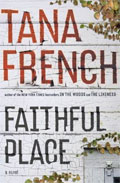Children’s Books: Don’t Touch That Toad & Other Strange Things Adults Tell You by Catherine Rondina
 -- in most regards --- to be an intelligent woman so how can I actually believe -- for example -- that consuming cheese late at night will give me bad dreams? Or if you swallow chewing gum, it will take years upon years to digest.
-- in most regards --- to be an intelligent woman so how can I actually believe -- for example -- that consuming cheese late at night will give me bad dreams? Or if you swallow chewing gum, it will take years upon years to digest.If I’m being fair, I guess I’d be forced to admit that it’s possible that at least some of the misinformation my mother fed me was fed to her by her own mother... and her mother and so on. Still, I can’t help but think how different things might have been if I’d had a copy of Catherine Rondina’s Don’t Touch That Toad & Other Strange Things Adults Tell You (Kids Can) a whole book dedicated to clearing up the odd and ill-conceived things parents sometimes tell their children.
A dog’s mouth is cleaner than a human’s. (False says the book.)
Bats fly blind. (Again false.)
A chicken can live without its head. (True. But not for very long.)
Each strange thing a parent might tell you is followed by a page of explanation. These explanations are, perhaps, a bit oversimplistic, and sometimes even preachy. For instance on the entry for the gum is your gullet, the response is False: chewing gun won’t last for years in your stomach. But even so, the book warns, swallowing the stuff might be a mistake, after all, “Even though it won’t get stuck in your stomach for years to come, chewing gum can cause problems to your teeth. So try to chew only sugarless gum., and don’t have more than one or two pieces a day. Oh, and when you’re done, spit it out into the garbage!” Though I’m not sure why, since we’d already established that swallowing the stuff wasn’t going to hurt you anyway. (I mean, it is or it isn’t: one can’t really have it both ways.)
Few of the explanations take into account the tiny grain of truth that get things like this started. For instance, “An apple a day keeps the doctor away,” is judged false. Yet it doesn’t take a scientist (or a doctor) to tell you that eating fresh fruit every day will, in fact, keep you healthier. On the other hand, many answer move beyond true or false and the book offers information, then leaves room for children to decide for themselves.
All in all, it’s a fun little book that children 7-10 are likely to enjoy. after all, what kid doesn’t love knowing something his or her parent does not know? ◊
Monica Stark is an American writer and editor and a contributing editor to January Magazine. She currently makes her home on a liveaboard boat somewhere in the North Pacific.
Labels: children's books, Monica Stark


































